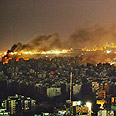
'Amnesty International biased'
NGO watchdog says Amnesty released more documents on Israel than Sudan in 2006
The criticism came ahead of an expected release of an Amnesty annual report on human rights.
"For many around the world, Amnesty International is considered to be a highly reliable and objective source of information on human rights," Gerald Steinberg, Executive Director of NGO Monitor told Ynetnews.
"However, as NGO Monitor has shown, their clear adoption of one sided political bias, and skewed global views mean Amnesty's reports and publications need to subject to the same type of independent questioning and analysis as any political or governmental body."
In its analysis of Amnesty International's activities in 2006, seen by Ynetnews, NGO Monitor said it looked at Amnesty's "relative emphasis on Israel in comparison to other countries in the Middle East."
The study found that "Amnesty International focused disproportionately on condemnations of Israel, far beyond any reasonable distribution of resources in a region marked by fundamental human rights abuses by many repressive regimes and sources of violence."
More condemnations than Sudan
The analysis added that "Amnesty singled out Israel for condemnation to a far greater extent than Iran, Sudan, Saudi Arabia, Libya, Syria, Egypt, and other chronic abusers of human rights."One of the report's key findings was that Amnesty released more documents condemning Israel than Sudan in the past year.
"The number of publications devoted to Israel (excluding urgent actions) (48 documents) is significantly higher than other countries in the region, such as Hizbullah (17 documents), the Palestinian Authority (10 documents), Saudi Arabia (2 documents). The number of documents (excluding urgent actions related to Israel) (48) is even higher than the number of significant publications by Amnesty on Sudan (37)," the report said.
NGO Monitor also examined Amnesty's record during the Second Lebanon War, and concluded that the human rights organization was guilty of double standards in its treatment of Hizbullah and Israel.
Amnesty accused "Israel of targeting residential areas without mentioning Hizbullah's systematic practice of operating from within civilian areas," the report said, adding: "Many of Amnesty's claims regarding the Lebanon War were false or severely lacking in credibility."
In addition, "no statements or documents of any type were issued condemning Hizbullah for abducting two Israeli soldiers, despite Amnesty's core mission of promoting freedom for political prisoners," the NGO Monitor report said.
Other examples of bias included the conflation "of the numbers of civilian and Hizbullah dead (estimated at around 650) in its casualty figure of 1000," while only mentioning "the Israeli civilian dead in its casualty figure for Israel," said NGO Monitor.
"The illustrations above are but a very few examples of the biased perspective that dominated Amnesty International's publications in 2006, leading to the dissemination of unbalanced and, at times, inaccurate information about the situation in the Middle East," the report concluded.
Higher standard
Responding to NGO Monitor's report, Amnon Vidan, director-general of Amnesty International's Israel branch, said the organization expected Israel and other democratic states to abide by a higher standard of respect for human rights than non-democratic regimes.
"You can't take samples of Amnesty's reports based on word counts," Vidan said. "Factually, the picture given in the NGO Monitor report is incorrect. Sudan does not receive less attention than Israel. In principle, Amnesty's treatment of different crises is based on different parameters, such as our ability to influence, and need to present issues to media," he added.
"There is an expectation of Israel and other democratic states to abide by a higher standard than Sudan. I would suggest NGO Monitor address the content of documents, rather than count their words. That way they will be able sympathize with the suffering of non-Jews," Vidan said.
He added that "Amnesty condemned both Hizbullah and the IDF for their attacks on residential areas and killing of civilians. Amnesty also noted that in some opportunities, civilians were used (by Hizbullah). But in some situations, the attacking power still has a responsibility not to harm civilians. Amnesty is aware of complexities, but there are many instances when (Israel) attacked civilian areas without there necessarily being a Hizbullah presence in the area, and with exaggerated use of force and no differentiation of civilian and military."
'Abduction did not violate international law'
Addressing the charge that Amnesty counted Lebanese and Israeli civilians differently, Vidan said: "In Israel, one can differentiate between civilians and soldiers. In Lebanon, you can't always make that differentiation."
Vidan added Amnesty did not condemn Hizbullah's initial attack in which it took IDF soldiers captive because the abduction "did not violate international law. We also didn't condemn the taking of Hizbullah members into captivity by the IDF. Only the taking of civilians captive is against international law."
"We can however condemn, and have condemned Hizbullah for not reporting on the condition of the hostages and not allowing the Red Cross to visit them," he added.










